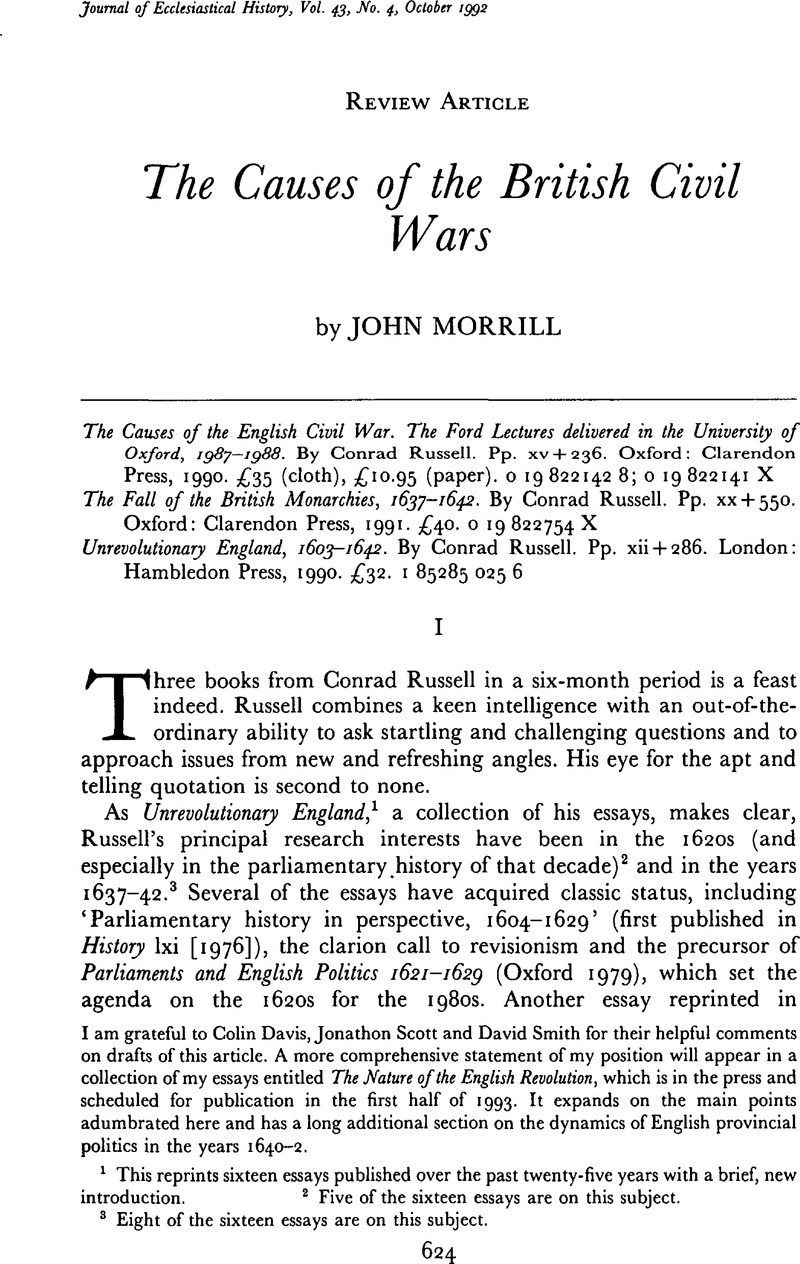Article contents
The Causes of the British Civil Wars
Published online by Cambridge University Press: 06 February 2009
Abstract

- Type
- Review Article
- Information
- Copyright
- Copyright © Cambridge University Press 1992
References
I am grateful to Colin Davis, Jonathon Scott and David Smith for their helpful comments on drafts of this article. A more comprehensive statement of my position will appear in a collection of my essays entitled The Nature of the English Revolution, which is in the press and scheduled for publication in the first half of 1993. It expands on the main points adumbrated here and has a long additional section on the dynamics of English provincial politics in the years 1640–2.
1 This reprints sixteen essays published over the past twenty-five years with a brief, new introduction.
2 Five of the sixteen essays are on this subject.
3 Eight of the sixteen essays are on this subject.
4 First published in History lxxii (1987).
5 The Causes of the English Civil War, p. ix; cf. ibid. 2.
6 Blair Worden's review based on a careful reading of the two books lays down a powerful challenge to the self-sufficiency of these seven ‘causes of the events’ and to the illogicality of Russell's reliance upon them: Blair, Worden, ‘Conrad Russell's Civil War’, London Review of Books, 29 08 1991, 13–14.Google Scholar
7 Cf. Macinnes, A., Charles I and the Making of the Covenanting Movement 1625–1640, Edinburgh, 1991,Google Scholar and essays by Macinnes, , Cowan, E. J., and others in Morrill, J. S. (ed.), The Scottish National Covenant in its British Context 1638–1651, Edinburgh 1991. Perhaps I should add that I am sympathetic to Russell's emphasis on religious factors if not wholly to his characterisation of them: idem. ‘A British patriarchy? Ecclesiastical imperialism under the early Stuarts’ (forthcoming).Google Scholar
8 Idem. The Nature of the English Revolution, ch. xiii, in a long section, omitted here, argues that Russell underestimates the pressure that the English junto was under from what was happening in provincial England, and that he does not account for the behaviour of that majority of MPs who were independent of the clusters of peers and their allies/clients in the Commons around whom he has woven his narrative.
9 Idem. ‘A British patriarchy?
10 Levack, B., The Formation of the British State, Oxford 1987, 108–11, 128–9.Google Scholar
11 Donald, P., An Uncounselled King, Cambridge 1990, chs v-vii.Google Scholar
12 I would like to add a caveat about another potentially misleading statement on a matter of some importance. In The Fall of the British Monarchy, 189, Russell writes that ‘we are given a rare glimpse of the advance planning behind these petitions and also of the irritation Scottish pressure could cause for their English friends, in a letter written by Lord Howard of Escrick’. But the ensuing discussion does not demonstrate the former point (and even the latter is not straightforward). His subsequent gloss, that ‘central prompting [of which there is no evidence adduced in this case] was not a sufficient condition for the presentation of this petition’ is nearer the mark. See now Maltby, J. D., ‘Approaches to the Study of Religious Conformity in late Elizabethan and early Stuart England’, unpubl. PhD diss., Cambridge 1991, chs iii, iv.Google Scholar
13 Gardiner, S. R., The History of England…1603–1642, 10 vols, London 1892, ix. 179–81.Google Scholar His lengthy footnote discusses the correspondence of leading English peers and the Scots allegedly culminating in Lord Savile's forgery of the signatures of six other peers alongside his own to a letter inviting the Scots to invade England and promising them military aid if they did so. On the basis of the later memoirs of (he supposes) the 2nd earl of Manchester Gardiner believed both that such a letter was sent and that it was Savile's forgery. (Clarendon tells substantially the same story in his History, Book II, para 107.) Donald, , Uncounselled King, 246–7Google Scholar casts doubts on the reliability of these memoirs. The behaviour of those implicated in treason by Savile in remaining his friends and helping him to fulfil his ambitions for high office (Russell, The Fall of the British Monarchies, 263), even meeting at his house to co-ordinate with the Scots in drawing up of the Root-and-Branch petition (Donald, Uncounselled King, 281) deepens the mystery. It is possible that the letter was sent but was not a forgery so that Manchester, fearful the Scots might reveal earlier treasons, sought to lay blame on Savile; or that he made up the whole episode. It is also possible that the author of the memoirs was not Manchester but Falkland, or someone else. Less controversial is the status of the earlier correspondence between Savile and his fellow peers and the Scots (as published in John, Oldmixon, History of England during the Reigns of the Royal House of Stuart, London 1730, 142–4). The episode ought to be central to Russell's discussion, yet it is completely bypassed.Google Scholar
14 This point is developed at length in the longer version of this essay: Morrill, , Mature of the English Revolution, ch. xii, sect. ix.Google Scholar
15 See now Peter, Lake, ‘Anti-popery: the structure of a prejudice’, in Cust, R. and Hughes, A. (eds), Conflict in Early Stuart England, Harlow 1989, 72–106.Google Scholar
16 Hunt, W., The Puritan Moment, Cambridge, Mass. 1983, pt 3Google Scholar; Hughes, A., ‘Thomas Dugard and his circle’, Historical Journal 29 (1986), 771–94CrossRefGoogle Scholar; Fielding, J., ‘Puritan opposition to Charles I: the diary of Robert Woodford, 1637–1641’, Historical Journal 31 (1988), 769–88CrossRefGoogle Scholar; Salt, S. P.,‘The origins of Sir Edward Dering's attack on the ecclesiastical hierarchy, Historical Journal 30 (1987), 21–52.CrossRefGoogle Scholar
17 Nicholas, Tyacke, ‘The Fortunes of English Puritanism 1603–1640’, Friends of Dr Williams Library, 44th Annual Lecture (1990).Google Scholar
18 Gardiner, , The History of England, ix, x.Google Scholar
- 1
- Cited by




